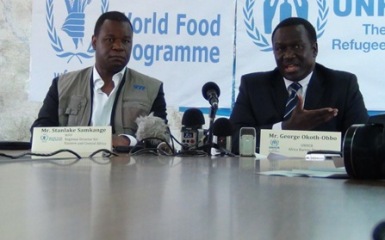Upper Nile: UNHCR concerned about refugees as rains hit
September 12, 2012 (JUBA) – The UN refugee agency is concerned about the welfare of refugees in the four camps in Maban County, Upper Nile State, which have in recent days suffered the impact of heavy rains.

“Our top priority is to make sure that refugees do not suffer because of this extreme weather, which is already affecting the local population in certain areas of Bunj town,” said Mireille Girard, UNHCR’s representative for South Sudan.
The most affected areas, the statement extended to Sudan Tribune says, are the main road through Bunj, capital of Maban County, to the three camps of Doro, Yusuf Batil and Gendrassa, which are reportedly all flooded.
However, although the road is said to be badly affected, assessment teams from the UNHCR and its procurement counterpart (UNOPS) reportedly managed to reach the three camps, which collectively host about 89,500 refugees.
“We are watching the situation closely and we hope we will be able to continue providing services and relief items as normal to the 108,000 refugees we are assisting in Maban County,” said Girard.
Also underway, she said, is an intensive effort by the agency to involve private companies to assist UNOPS in the ongoing road works.
“With the current flooding in the Bunj area, these engineering teams will be overstretched in the coming weeks to secure vital humanitarian access and complete the all-important work of moving refugees to drier ground,” Girard noted.
In addition, UNHCR has also joined a flood-response team convened by county authorities, along with experts from the local government and other UN agencies.
UNHCR APPEALS FOR $20m
Meanwhile, up to US$20m is urgently required by UNHCR, between now and end of year, if the critical needs of thousands of refugees in South Sudan are to be fully met, George Okoth Obbo, its Africa Bureau Director said on Saturday.
The fund, Obbo told journalists, will cover the “absolute” critical requirements in form of road repairs and access and establishment of emergency shelters in preparation for an anticipated 30,000 more people who are expected to arrive into the young nation.
“There are competing priorities that have to be met,” he told a press conference in Juba, the South Sudan capital.
“We could have anything between 30,000-35,000 people that could come into the country as the year comes to an end. This is planning figure and certainly we need to preposition ourselves and continue looking for sites in which people can be accommodated,” he added.
Obbo, who was in South Sudan to assess the situations of refugees in the various camps, also acknowledged the extreme hardships these people went through, with many of them reportedly surviving on leaves for days and weeks.
UNHCR, he said, remains financially incapacitated to handle the influx of refugees, saying only 40 percent of the $183m requested by the agency, has so been received.
“We have only got about $73m out of the $183m required for emergency operation and so you can clearly see the gap in the funding,” Obbo observed.
The agency’s Africa Bureau Director also expressed concerns about the high morbidity and child mortality rates in the camps visited, citing food and nutrition, logistics platform, contingency preparedness and scarcity of resources as key challenges that needs immediate address.
(ST)
